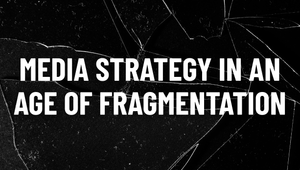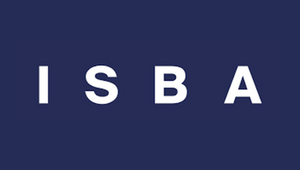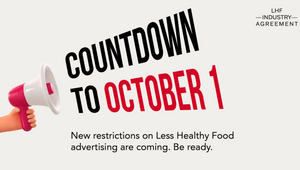
Why Treating the New Thing like the Only Thing Is Hurting the Industry

On October 10th 2023, the IPA’s EffWorks Global (a hybrid conference) will provide unparalleled opportunities for brands and agencies to arm themselves with the knowledge needed to navigate marketing effectiveness, and improve business performance. In the weeks leading up to the event, LBB is discussing the most crucial themes in effectiveness today with some of the leading thinkers and leaders in the conversation.
“Creativity isn’t this abstract craft, it’s the engine of effectiveness.”
This is the conclusion that Laurence Green, director of effectiveness at the IPA, has reiterated once more following recent research commissioned by Thinkbox. Laurence will present the findings together with Paul Dyson, co-founder of Accelero Consulting, at this year’s EffWorks Global.
While Laurence’s career has seen him progress from creative strategist into business director and co-founder of agencies Fallon and 101, Lindsey has worked at the marketing body for commercial TV that she now leads for over 16 years.
When designing what form the research was going to take, Laurence said, “Let’s talk to the people who know what good looks like.” That’s how they ended up talking to countless CCOs, CSOs, and CEOs of agencies and CMOs at “very good client companies” to find the insights. “We wanted to talk to people who design their agencies to do great work,” he adds. The questions were left open to ensure that everyone could communicate freely about the issues they’re facing and, vitally, what creativity looks like in their work and in their processes.
Why the focus on creativity? “We commissioned Paul Dyson at Accelero Consulting to find out what is the biggest multiplier of ROI,” says Lindsey. Paul looked at 28,000 global campaigns, 7,000 of which were from the UK, to try and isolate the different variables. His first finding - and the top variable which influences ROI - is brand size; brand size is x20 multiplier of ROI. “If you’re a really big brand, a big business, you’re going to get a bigger return on investment and that makes perfect sense.” The next biggest multiplier was creative quality, which was found to achieve a x12 multiplier return on investment. “Out of all the tools available at our disposal, creativity is the one that can make the biggest difference,” adds Lindsey. “Are we focusing on that enough as an industry? It seems like creativity has somewhat faded into the background at the moment.” It’s worth noting that the third most important multiplier of ROI is ‘budget setting across economies’ though it’s a comparatively small figure of x5, exposing the gap between the factors and supporting the argument that creativity is what needs renewed industry attention.
What that creativity looks like is “different in every case,” says Lindsey, preempting criticism that research like this creates a prescriptive vision of creativity. “However, we have found that the most effective creative has some characteristics in common. It’s appropriate for the brand in question; it’s well-liked by consumers and the general public. We found that likability was the factor that most strongly correlated with effectiveness, and the likability has to extend behind the scenes to the people working on it too.”
“There are obvious executional differences when it comes to what that creativity looks like,” explains Laurence. “We talked to people at Lloyds Bank, McDonald’s, and Yorkshire Tea. Take Lloyds Bank - its unapologetic icon is the black horse which has been front and centre of its communication for eight years while the logo dates centuries back; it’s icon-led and status-led communication. McDonalds has developed a really winning tone of voice in the UK, I think, and we all tend to like and recognise its advertising because it’s part of the fabric of Britain not just as a fast-food restaurant, but as an advertiser.”
Effective creativity, then, comes in different forms. “But the best stuff is almost invariably consistent, commits to and understands an idea, and reaps the rewards over time,” Laurence adds.
The tyranny of measurability
If this is all either known or easy to learn, why is the industry then losing sight of how important creativity is? There’s no single answer and the answers that we do have are complex - the economy, digital revolution, advancements in technology, and measurability. Lindsey also notes that “when media and creative separated, media became a highly sophisticated industry. At conferences now the agenda tends to be dominated by measurement, segmentation, and targeting as well as the possibilities of data and AI. The problem is that these topics are eclipsing the single biggest driver of effectiveness.”
Both Lindsey and Laurence acknowledge that the turn towards the measurable is understandable in an industry where timelines and budgets are shrinking. “As practitioners, we’ve rushed towards certainty and science and what works in the short-term. But I think we’ve overcorrected. A lot of businesses are set up to serve the immediate rather than the important,” Laurence summarises.
The speed at which the world moves presents an inherent challenge for everyone involved in ad-making. Lindsey and Laurence echo each other in saying that “it’s tough out there and there’s a lot of short-termism. It’s not to do with ‘bad’ clients or ‘bad’ agency motives. There’s not enough time to dedicate to fashioning a long-running idea, understand it, commit to it, and keep everyone on the same page.”
Two further factors are inhibiting creatives’ ability to produce the kind of work that contributes to long-term brand building and ROI: awards ceremonies, and attempts to chase what’s new. Lindsey points out that “something counterintuitive is going on with creative awards. What tends to win are very purpose-led, almost gimmicky campaigns that don’t have very wide awareness.” The pressure is seemingly coming from inside the industry itself. “One of the surprising findings from this research was learning that creatives are almost incentivised to make that kind of work because it’s what gets celebrated, but these campaigns aren’t going to make a difference to the business’s bottom line. That’s dangerous because it’s getting in the way of the kind of creativity that’s really going to shift the needle and make a difference for clients,” she adds.
Laurence says that companies, even industry behemoths, find it easy to be blown off course when faced with the shiny new thing. Often, it’s seen as a requirement for businesses to have a point of view about new developments, whether that’s last year’s metaverse or AI today. “The distractions are so many and so urgent that people get led astray and suddenly do some work that doesn’t feel right,” Laurence says. “We don’t need to throw out the old to make space for the new if we take the long view. Actually, the thing that still impacts businesses most, week to week, is good old fashioned broadcast advertising. It almost sounds like a dirty little secret, like we all expect the effective thing to be something else.”
Continuity and traditional solutions, like broadcast advertising, don’t sit that well with individuals looking for faster return on investment. “There’s a lot of demand from the C-suite for businesses to be ‘future-focused’ and working towards a digital transformation. There’s huge pressure to have a good answer when a client is inevitably asked about it,” Lindsey says. It’s then understandable that it’s becoming increasingly difficult to argue for the ‘traditional solution’ even when “it’s categorically the best and most effective solution.”
Laurence and Lindsey are very sober about the state of the industry but it’s far from all doom and gloom in their view. “There’s a helpful sea change in attitudes and an acknowledgement that we’ve gone a bit too far. Some of this will correct itself because the creative directors who sit on juries and make the decisions can tell that there’s a need for a reset,” offers Lindsey. Additionally, Thinkbox and the IPA are very happy to spearhead more of that change through their past, present, and future collaborations, some of which will be presented at EffWorks in October. “We know that the onus is on us to provide the effectiveness data, the rationale, and the evidence to show what works,” she adds.
We press them on some insights that they can share before the presentation and both are kind enough to spotlight a few key things the industry should start thinking about now. Lindsey advises that creative teams “have a shared frame of reference for what great looks like” by analysing inspiring and effective examples of advertising. “Commit to being ambitious about creativity because look at what’s to be gained - you can improve your ROI by x12. That’s why this is so important.”
Laurence offers the closing remarks. “We talk a lot about the attention economy in this industry and I think marketing departments and ad agencies have little mini attention economies of their own. We don't give enough attention to the stuff that really matters: understanding our brand inside out and making it different and distinctive to the competition. We have to trust in creativity and create the conditions for it to proliferate, which isn’t easy. If you're not creating enough time in your organisation and with your suppliers and partners to do amazing creative things on your brand's behalf,” Laurence pauses and concludes with a smile, “then you’re not a very good businessperson.”
To learn more about IPA and Thinkbox’s research and see ‘the show’ for yourself, get your tickets for IPA EffWorks Global 2023 – a hybrid conference where creatives, strategists, brand marketing and agency leaders alike can get involved in effectiveness. Laurence and Paul will be two of many expert speakers sharing knowledge on what effectiveness in marketing means today.













